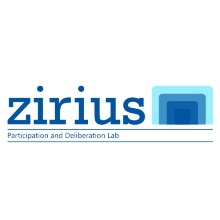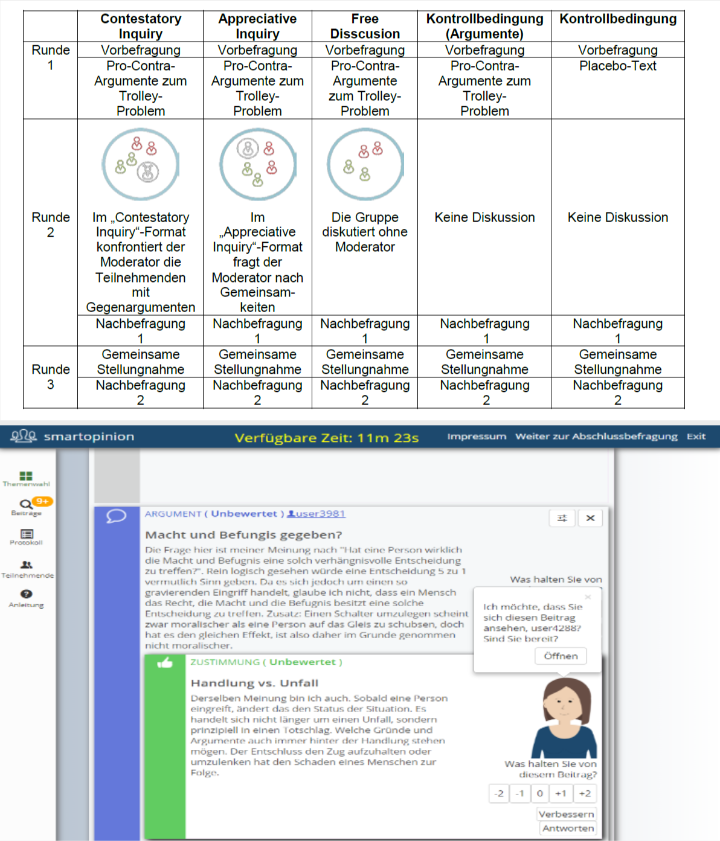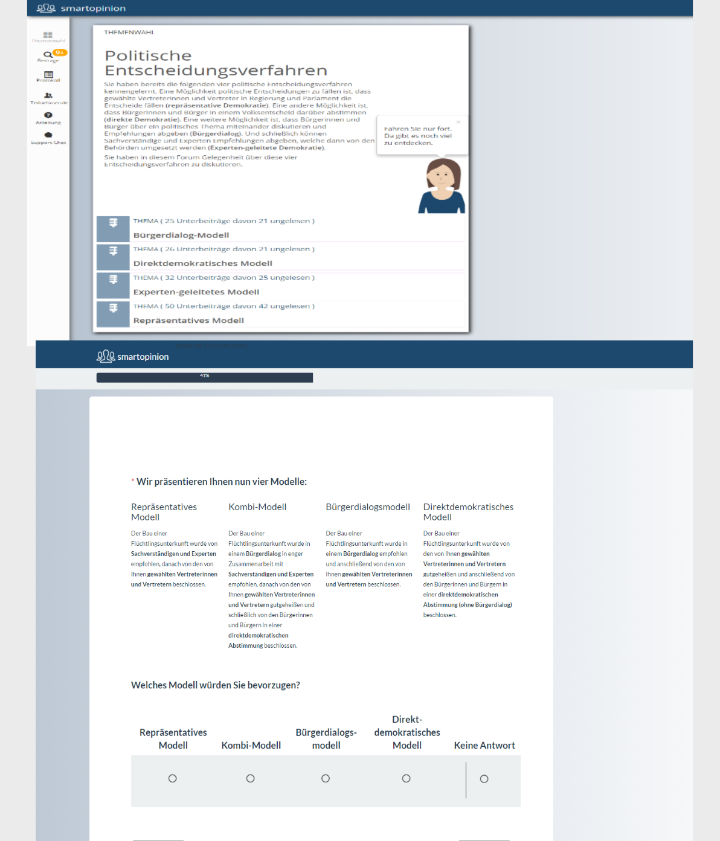The ZIRIUS Participation and Deliberation Lab provides a platform for innovative experimental and observational research on deliberation and citizen participation. Deliberation and citizen participation have moved to the forefront of current research in political science and sociology, but despite myriads of practical applications world-wide we lack robust and systematic knowledge under which conditions these democratic innovations work to which effect. By conducting novel types of lab and survey experiments, by applying advanced research designs to understand deliberation and participation, by employing and developing novel tools to stimulate deliberative activities and by measuring the quality of deliberation in automated ways, the ZIRIUS Deliberation and Participation Lab tries to close this research gap. Moreover, the Lab also consults researchers and practitioners how to run deliberative and participatory events effectively and how to evaluate their performance and their outcomes.
Research Areas and Projects:
Communication Experiments
Optimal Communication: The goal of this project – funded by the Terra Incognita Fund of the University of Stuttgart - is to test how different communication formats - debate-style formats (“contestatory inquiry”) vs cooperative dialogue formats (“appreciative inquiry”) - affect internal communicative dynamics and outcomes in the context of the famous Trolley-dilemma. The research hypothesis is that epistemic advancement is promoted by debate-style formats whereas common ground is promoted by cooperative dialogue formats. The project brings together experimental research, multi-agent simulation, computer linguistics and artificial intelligence research for the first time.
- Research team: André Bächtiger, Gregor Betz, (KIT), Raphael H. Heiberger, Jonas Kuhn and Sebastian Pado (University of Stuttgart)
- https://www.beschaeftigte.uni-stuttgart.de/uni-aktuell/meldungen/terra-incognita-projekte/
- https://www.uni-stuttgart.de/universitaet/aktuelles/presseinfo/Foerderprogramm-Terra-incognita-fuer-Pionierforschung-in-unbekannten-Zukunftsbereichen/
This project - sponsored by the Swiss National Science Foundation - will explores how citizens make decision in Swiss direct democracy when exposed to one-sided vs multi-sided and balanced argumentation.
Research team: André Bächtiger, Marc Bühlmann, Marlène Gerber, Anja Heidelberger (University of Bern) and Dominik Wyss
Survey experiments on democratic preferences
Viele Bürgerinnen und Bürger sind unzufrieden mit dem Funktionieren der repräsentativen Demokratie in Deutschland. Gerade diejenigen, die sich in prekären Lebenslagen befinden, fühlen sich immer weniger von Politik gehört und vertreten. Damit befasst sich das Forschungsprojekt „Inklusive Demokratie – Die Sicht von Menschen in prekären Lebenslagen auf die Demokratie“, welches vom dem Participation und Deliberation Lab (ZIRIUS) der Universität Stuttgart zusammen mit den Demokratiebegleitern des Sozialunternehmens Neue Arbeit gGmbH [http://www.demokratiebegleiter.neuearbeit.de/] durchgeführt wird.
Uns geht es um die Fragen:
- Wie sollen aus der Perspektive von Menschen in prekären Lebenslagen unserer Demokratie politische Entscheidungen getroffen werden?
- Und wer soll die Entscheidungen treffen? Gewählte Vertreter*innen, Bürger*innen, oder beide zusammen?
In Deliberationsveranstaltungen haben die Teilnehmenden die Möglichkeit unterschiedliche Demokratiemodelle zu diskutieren und als Expert*innen in eigener Sache diese auch zu bewerten. Solch ein dialogorientiertes Verfahren stellt ein hervorragendes Diagnosetool dar: Statt dass Teilnehmende in wenigen Sekunden auf Fragen antworten, lässt sich im Dialog viel präziser feststellen, wie Wünsche und Interessen aussehen, wenn sie sich mit anderen ausgetauscht und intensiv darüber nachgedacht haben. In jeder Veranstaltung gibt es zudem eine Vor- und Nachbefragung, in der die Teilnehmenden anhand eine „Conjoint-Analyse“ vor Entscheidungssituationen gestellt werden und so unterschiedliche Kombinationen von demokratischen Modellen bewerten können.
Haben Sie weitere Fragen? Wir geben gerne Auskunft!
Jan Velimsky und Manuel Walter
Inklusive-Demokratie@gmx.de
Citizen involvement in deliberative forums is frequently discussed with an eye on boosting the legitimacy of democratic decision-making. However, this idea has been radically challenged by Cristina Lafont (2015), arguing that such forums may eventually decrease rather than increase democratic legitimacy. Yet Lafont´s legitimacy challenge has been primarily discussed at a theoretical level, without taking the perceptions of non-participating citizens (´onlookers´) into account. In the project “Was sich Bürger von deliberativen Beteiligungsverfahren wünschen: Eine Online-Umfrage mit einem Präferenzexperiment zur Erfassung perzipierter Legitimitätsvorstellungen”, just funded by the Deutsche Forschungsgemeinschaft (DFG, German Research Foundation - 432370948) puts the “Lafont conjecture” to an empirical test by implementing a conjoint experiment to examine legitimacy perceptions of a representative sample of German citizens. It focuses on a set of institutional design features of deliberative forums such as authorization mechanisms (e.g., binding decisions vs recommendations) or recruitment techniques (random vs self-selection), combining these design features with substantive aspects (issue salience and outcome favorability), attitudinal dispositions of participants (e.g., political disenchantment and general process preferences), participants´experiences with such forums as well as information on the pros and cons of the various design elements of deliberative forums.
Research team: Saskia Goldberg and André Bächtiger
In a survey experiment (funded by the NCCR Democracy) with German citizens conducted in 2016, we tested the counterfactual which democratic model - representative, direct-democratic, deliberative or integrated – citizens would prefer if they had the possibility to deliberate about it (in an asynchronous chat; SmartOpinion). Our findings (Goldberg et al. 2019, Political Studies https://journals.sagepub.com/doi/abs/10.1177/0032321719843967) show that preferences on democratic governance models are mainly driven by (situation-specific) issue salience and disenchantment with the actual shape of representative democracy. However, deliberation in itself did not lead to different preferences for governance models than just ‘thinking twice’ about them. We find surprisingly high levels of consistency between basic democratic values and governance choices already before the experiment.
The deliberative survey experiment was also featured in the LSE Blog:
Research team: Saskia Goldberg, Domink Wyss and André Bächtiger
Automated measurement tools for discourse quality
For a long time, studying communication processes empirically and assessing the quality of discourse was a highly demanding and time-consuming endeavour, requiring in-depth content analysis and extensive reliability testing. Computer-assisted textual analysis can help to speed up data collection and supersedes reliability testing. This research area will focus on a newly developed machine-learning tool for measuring deliberative quality on the basis of the Discourse Quality Index (DQI), dubbed DelibAnalysis (Fournier-Tombs and Di Marzo Seguendo 2019 https://journals.sagepub.com/doi/abs/10.1177/0165551519871828)
André Bächtiger, Marlène Gerber and Eléonore Fournier-Tombs (2019): Discourse Quality Index (DQI): A Critical Appraisal





